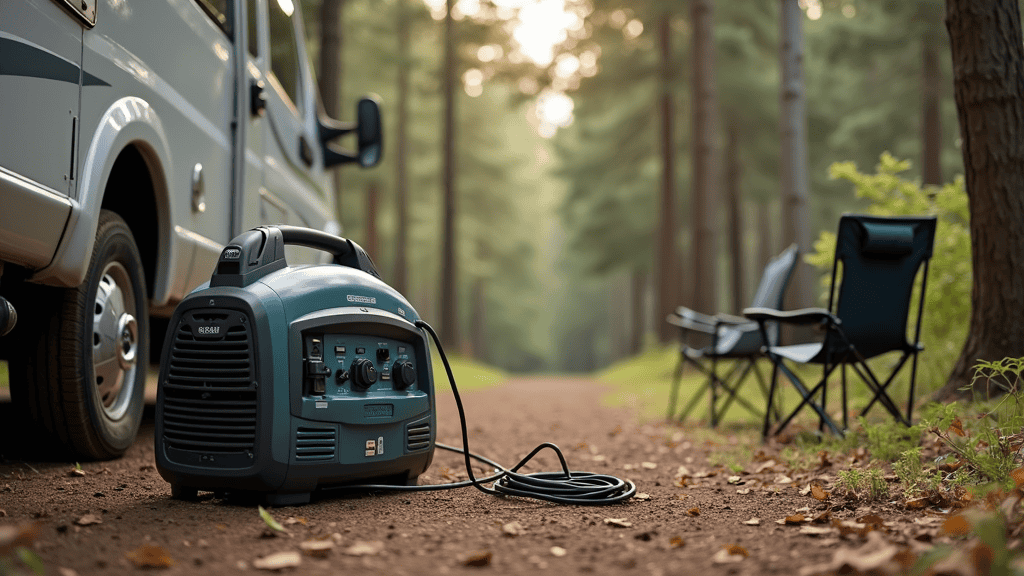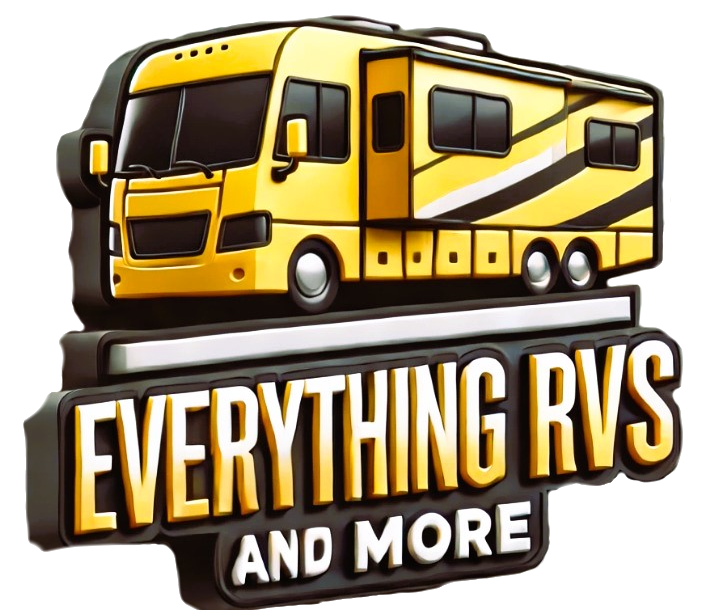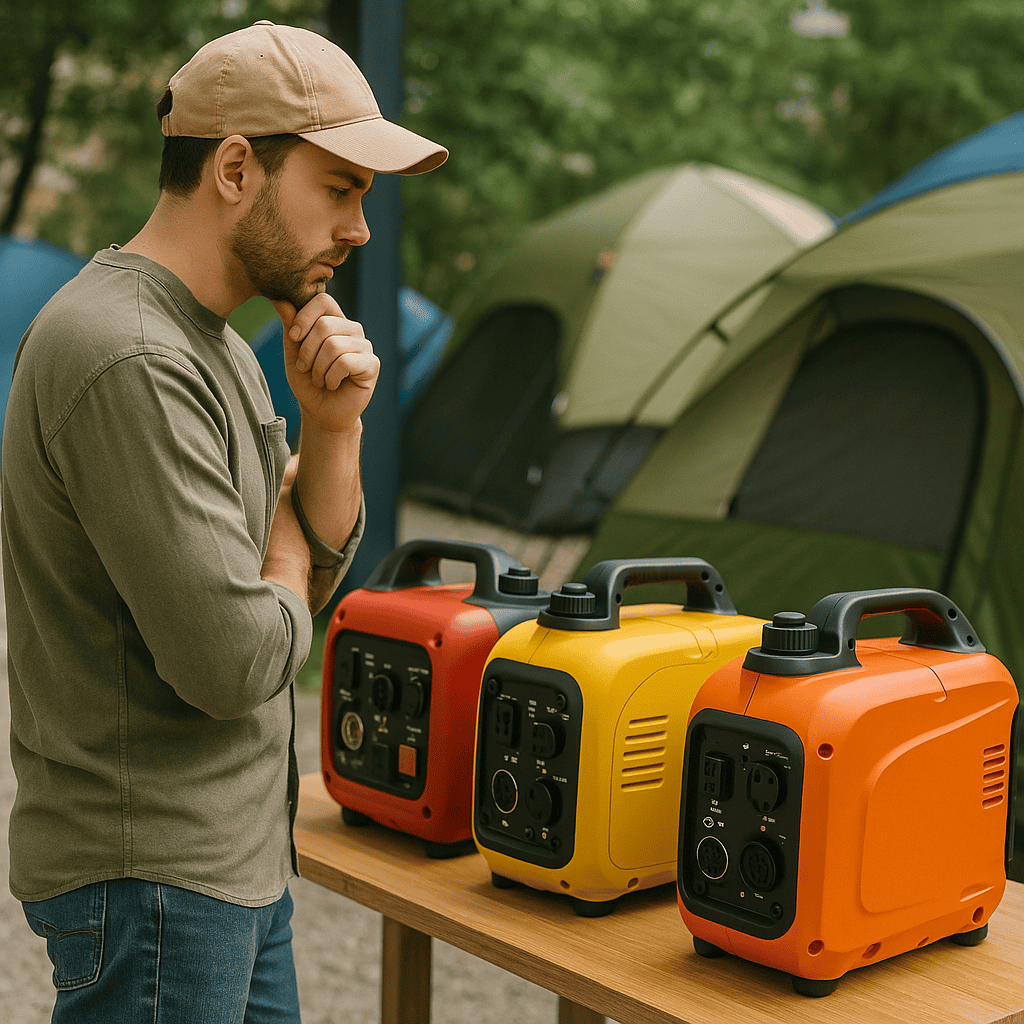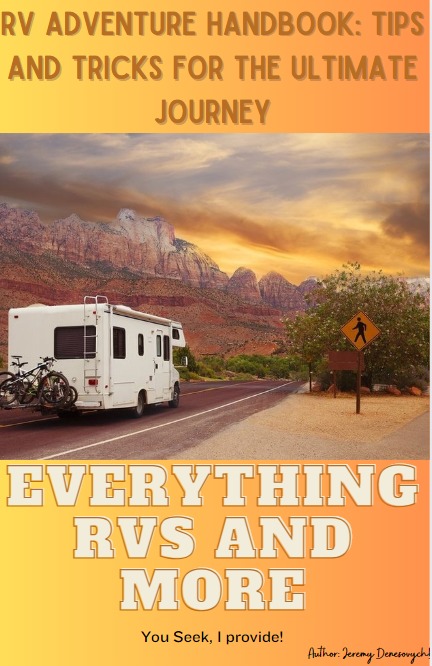Affiliate Disclosure: I earn commissions if you shop through the links below at no additional cost to you.
Last Updated on July 2, 2025 by Jeremy
 Picking the right portable generator for your RV setup can be a significant decision. If you’ve ever spent time camping off-grid, you know how important reliable power is for things like your fridge, AC, cooking, and just keeping your devices charged. But with all the generator models out there—different sizes, fuel types, noise levels, and price points—choosing the right one can get confusing fast.
Picking the right portable generator for your RV setup can be a significant decision. If you’ve ever spent time camping off-grid, you know how important reliable power is for things like your fridge, AC, cooking, and just keeping your devices charged. But with all the generator models out there—different sizes, fuel types, noise levels, and price points—choosing the right one can get confusing fast.
Not every portable generator works for every RV. Power needs, camping style, local noise restrictions, and your budget all come into play. I’ve learned a lot through both my own RV trips and helping others with their setups, so I’ll walk you through tips and questions to help you decide which generator will really work for your needs.
This guide covers the main factors to consider before buying, plus examples and advice to show what actually matters once you’re out on the road. Whether you’re an RV rookie or seasoned traveler, you’ll find info here that will support making a confident decision for your adventures.
Understand Your RV Power Needs
First things first: figure out how much electricity your RV really uses. Many people buy a generator that’s too small for their actual setup, or one that’s way bigger (and heavier) than needed. Neither situation is ideal and can cause frustration.
Check Your Appliances and Devices
- Make a list of essentials like your air conditioner, microwave, TV, fridge, water heater, coffee maker, and anything else you use daily.
- Find the wattage requirements for each major device. This info is usually on a label or in the user manual. Don’t forget devices with high starting watts—like AC units—can need almost double the running wattage when they power up.
Calculate Total Running and Starting Watts
Add up the wattage for everything you might want to run at once. For items like the AC or a microwave, include their starting wattage. If you aren’t sure about these numbers, manufacturers like Honda and Champion offer handy wattage calculators online you can check out.
- Most smaller travel trailers manage fine with a 2000–3000W generator.
- For larger RVs or if you want to run AC, you may need 3500–4000W or more.
Knowing these numbers helps you quickly narrow down the right size generator for your RV. Keep in mind, it’s always better to have a bit of extra power than to end up overloaded during your trip.
Choosing Fuel Type: Gas, Propane, or Dual Fuel?
Portable generators mainly run on gasoline or propane, but dualfuel models handle both. The fuel type affects runtime, convenience, maintenance, and sometimes even noise.
Gasoline Generators
Gas generators are easy to refuel since gasoline is widely available. They usually offer more power in a smaller, lighter package, which is handy for solo travelers or those with limited space. The downside is that gas can go bad in storage and is more flammable, so proper safety steps are important.
Propane Generators
Propane is a favorite for some RVers because it burns cleaner, stores longer, and is simple to carry in tanks. Expect slightly lower wattage compared to the same generator on gas, but sometimes propane generators are a bit quieter. If you travel where gas is hard to find but always keep propane on board, this could be a smart pick.
Dual Fuel Generators
If you want maximum flexibility, dualfuel generators let you switch between gas and propane. These are super handy for longer trips or if you’re unsure about fuel availability where you’re heading. You can start on one fuel and switch to the other if needed, adding peace of mind on the road.
Inverter vs. Conventional Generator
If you care about noise, fuel efficiency, or want to power sensitive electronics, inverter generators are worth a closer look.
What is an Inverter Generator?
Instead of running at a constant speed, inverter generators can adjust the engine output depending on what you’re powering. This means much quieter operation and better fuel economy. Plus, they make a clean power wave so laptops, TVs, and phones are safe to plug in.
Who Should Pick an Inverter Generator?
- You want a quieter camping experience
- You need to charge electronics
- You value lighter weight and easier transport
Conventional (noninverter) generators still get the job done, but they’re usually bulkier, louder, and not ideal for sensitive electronics. For most solo RVers and families, I recommend inverters for the peace and quiet they provide.
Noise Level: Keeping Things Quiet
Camping should be peaceful, so a loud generator gets old fast, especially at night or in close campgrounds. Many parks also have rules about generator noise and allowed running times.
Understanding Decibels (dB)
- Look for noise ratings at 25% or 50% load, which are usually listed by the manufacturer.
- An inverter generator around 50–60 dB is about as loud as a conversation.
- Larger openframe generators or older models can be over 70 dB, which starts to bother neighbors.
There’s no need to pay extra for the quietest available generator, but if you camp around other people, a quiet one really pays off. Some campgrounds even have specific dB limits, so staying within these makes for happier trips for you and your neighbors.
Portability and Weight
If you’re moving the generator by yourself, weight and size are huge factors for day-to-day comfort and safety. Some larger generators tip the scales at over 100 pounds, which is a lot to lift and haul regularly.
- Small inverters (under 2,500W) often weigh about 40–60 pounds and have handles for easy onehanded carry.
- Bigger generators may include wheels and folding handles. Make sure the wheels work well on soft dirt or gravel if that’s where you’ll be using it.
Think about your storage space too. Some people stash the generator in their tow vehicle, under a dinette, or even in the shower during travel, so measure carefully before you buy.
Ease of Use and Basic Features
Some generators come loaded with helpful features that make RV life easier. Here are a few worth looking for:
- Electric Start: Forget pull cord battles. This feature is super useful on heavier units or in cold weather.
- Fuel Gauge: Lets you quickly see when it’s time to refill.
- Parallel Capability: Lets you pair two smaller inverters for more power—a good move if you start with one and want to upgrade later.
- RVReady Outlets: A 30amp RV plug (TT30R) saves you from using clunky adapters, making set up faster.
Don’t overlook features such as automatic low-oil shutoff and overload protection. These can protect your generator from damage if something goes wrong.
Budget and Brand Reliability
Price matters. You don’t need to spend top dollar for a great generator, but opting for the cheapest option often means giving up longterm durability and support.
- Honda and Yamaha: These are the popular picks for quiet, reliable generators. Expect to pay more up front, but they’re known to last for years with basic care.
- Champion, Westinghouse, and Wen: These are more budgetfriendly while still offering reliable performance and useful features for most users.
Check reviews to see how different models hold up over time, and always look at warranty details. Finding a brand with good customer service and easily available replacement parts can be a huge advantage if problems pop up during your travels.
Common Questions and Real World Examples
Can I run my RV air conditioner on a portable generator?
Most rooftop AC units need at least 2,000–3,000 starting watts. For many travel trailers, a 3500W inverter generator is usually enough to start and run a 13,500 BTU AC without trouble. Larger RVs with two ACs may need a bigger or second generator (using parallel mode).
How long does a portable generator run on a tank of fuel?
This depends on the generator’s size and chosen fuel source. Most 2000–2500W inverters run 6–10 hours on a tank of gas at half load—plenty for overnight use or daytime charging.
What if I mostly camp at places with hookups?
If you rarely boondock, a small generator for emergencies is enough. But if you often stay offgrid, investing in a higher wattage, quiet, and fuel efficient generator really pays off. It’s all about matching your generator to your camping style.
Checklist for Choosing the Right RV Generator
- Figure out your running and starting watt requirements. Add up everything you’ll power at once.
- Decide which fuel type fits your needs and travel route.
- Choose inverter technology if you want quiet operation and safe power for electronics.
- Check the weight. Make sure you can easily move and store it in your rig.
- Look for userfriendly features such as electric start and RVready plugs.
- Review noise ratings, especially important if you camp at state or national parks.
- See how brands handle support and replacement parts by reading real user reviews.
Key Tips for a Smooth RV Generator Experience
- Carry spare fuel (where safe/allowed) and stabilizer to keep gas fresh between trips.
- Run your generator outdoors, away from windows, because carbon monoxide is dangerous even outside.
- Use a heavyduty extension cord or RV adapter when plugging in.
- Practice using your generator at home before a big trip—get familiar with starting it, checking oil, and connecting your appliances. This helps prevent surprises when you’re actually on the road.
A great portable generator takes a lot of stress out of RV living. Whether you’re exploring far from hookups or prepping for unexpected power outages, the right generator gives you real independence. Think about your most important needs, weigh up the options, and you’ll end up with a generator that fits your RV setup perfectly. Safe travels out there!




.jpg/:/cr=t:5.56%25,l:0%25,w:100%25,h:88.89%25/rs=w:1240,h:620,cg:true)



Leave a Reply